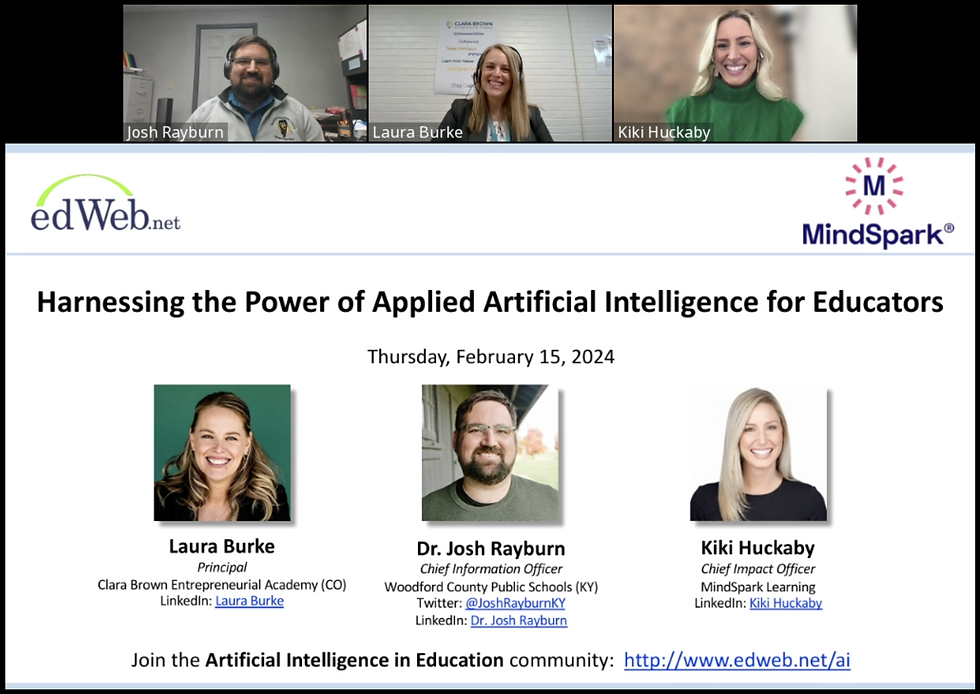Harness the Power of Applied AI for Educators
- Mar 22, 2024
- 3 min read
Updated: Jun 10, 2024
The following article was written by edWeb.net summarizing MindSpark's edLeader Panel on 2/15/2023.
Artificial intelligence has the potential not only to solve existing problems but also to create new opportunities for both learners and teachers. During the forward-looking edLeader Panel “Harnessing the Power of Applied Artificial Intelligence for Educators,” experts discussed the transformative potential of applied AI in education. Their discussion was both a theoretical exploration and a practical dive into how AI can revolutionize educational practices.
Dr. Josh Rayburn, Chief Information Officer for Woodford County Public Schools (KY), began the conversation by emphasizing the importance of educators moving beyond passive consumption of AI-generated content to actively using AI to streamline tasks and enhance the learning experience of students.
Laura Burke, Principal of Clara Brown Entrepreneurial Academy (CO), highlighted his points by sharing how teachers can leverage generative AI to help students begin complex projects and process information. Of course, she advocated for its use as a support tool rather than a substitute for genuine effort.

The panelists provided personal insights into their experiences with AI tools, demonstrating their practical benefits. Burke shared an insightful anecdote about using AI to draft a letter for a school field trip—which clearly revealed the gaps in her instructions. Her first attempt showed that she needed to be more precise in her prompts to the AI tool, underscoring the importance of clear communication and giving plenty of context when leveraging AI effectively.
Similarly, Dr. Rayburn discussed using AI to de-escalate an emotionally charged email, showcasing AI’s ability to aid in professional communication by providing objective, well-crafted responses.
The panelists recognized that there is a reluctance among some educators to integrate AI tools into their teaching. To help with this, they recommended a hands-on approach, suggesting that demonstrations of AI’s capabilities in solving everyday problems could help alleviate resistance. The importance of dedicating time to experiment with AI was highlighted, with a suggestion to invest a minimum of 10 hours to fully understand its potential, which is what AI expert Dr. Ethan Mollick recommends.
To support educators in harnessing the power of AI, Kiki Huckaby, a former teacher and the Current Chief Impact Officer at MindSpark Learning, introduced SparkPrompts, a free tool designed to facilitate effective prompt engineering. This guide breaks down the prompt-writing process into manageable steps, helping educators communicate more effectively with AI tools to achieve desired outcomes.
The panelists underscored the importance of selecting the right AI tools, like ChatGPT, Bard, and Copilot, noting their strengths and significant impact on educators’ efficiency and their potential to reduce planning time, thereby allowing more time for direct engagement with students.
They also delved into the ethical considerations surrounding AI in education. Huckaby emphasized the importance of focusing on AI’s positive potential while maintaining a human-centric approach, as she shared, “AI can be used for good, can be used for bad, or can be used for really ugly things. So how do we focus on the good and leverage it for positive outputs?”
One clear response was to ensure that AI is used to augment rather than replace the skill-building process. Additionally, educators need to build guardrails that ensure that AI’s application is guided by principles aimed at maximizing human well-being and positive outcomes. MindSpark’s public guidelines offer a framework for districts to adopt and adapt as needed, ensuring a responsible integration of AI into educational settings—a great jumping-off point for those who aren’t sure where to begin.
A concerning revelation from the discussion was that 70% of educators had not seen their districts take an official stance on AI. Dr. Rayburn warned that blocking AI tools could be counterproductive and stressed the need for school districts to embrace AI technology. He advocated for studying successful implementations, developing policies for AI use, and embracing the technology as an integral part of our future.
AI can have transformative power in redefining educational paradigms, from enhancing administrative efficiency to enriching the learning experience for students. Educators should embrace AI not just as a technological tool, but as a partner in the journey of learning and teaching.
By focusing on the practical, ethical, and innovative applications of AI, the panelists charted a course toward a future where technology and education converge to create more engaging, efficient, and effective learning environments. Through their insights and experiences, they provided a comprehensive guide for educators to navigate the integration of AI in education, ensuring that its potential is harnessed to enhance, rather than replace, the human touch in learning.



